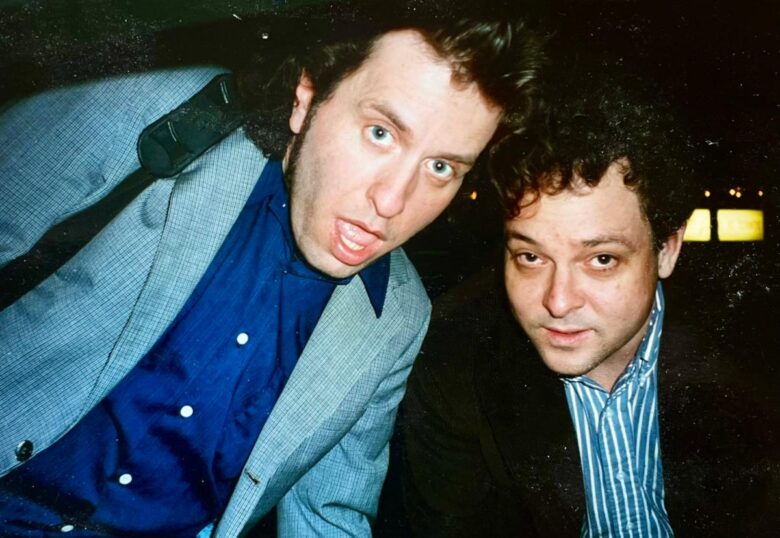Mark Mulcahy and Chris Harford Circa 1996
BIRDFEEDER FEATURES LATE 80’S BOSTON INDIE SCENE HEROES MARK MULCAHY AND CHRIS HARFORD, WITH PRODUCTION BY KEVIN SALEM
“SO TRIANGULAR” STREAMING NOW – LISTEN
“SO TRIANGULAR” OFFICIAL MUSIC VIDEO PREMIERES TODAY – WATCH
WOODSTOCK AVAILABLE VIA SOUL SELECTS RECORD APRIL 12
Indie rock supergroup Birdfeeder are releasing their new album, Woodstock (Soul Selects) on April 12. The band is comprised of heroes of the late 1980’s Boston music scene Mark Mulcahy on drums and vocals (Miracle Legion, Polaris) and Chris Harford on guitars and bass (3 Colors, Band of Changes). The album was recorded and produced in 2021 by Kevin Salem (Dumptruck, Freedy Johnston) at Distortion Tank Studios in the town that gave the album its name. Salem also plays guitar on the album.
Woodstock features eight songs, all of which were originally written and demoed on a 4-track Fostex cassette tape machine in 1996. The first song, “So Triangular,” is out now on all digital providers and an official music video is streaming on YouTube.
LISTEN TO “TRIANGULAR”
WATCH “TRIANGULAR” OFFICIAL MUSIC VIDEO
Chris Harford and Kevin Salem have been friends since the days of the thriving 1980s Boston music scene when Salem was in Dumptruck and Harford in 3 Colors, and it’s a mark of just how thriving it was that they only first met while each recording or touring in the UK. The third member of Birdfeeder, the one who gave both the act and the record its name, wrote the words, sang them, and also played drums, is Mark Mulcahy, familiar to many as a solo artiste par excellence, and before that, as frontman for Miracle Legion.
Birdfeeder have a pedigree, one that you can hear all over the seven new recordings (and one vintage demo) that comprise Woodstock. It’s exemplified by how the trio sounds constantly relaxed, confident, unhurried, and yet uncomplicated.
“Beyond the pleasure of being with those two guys, guys that I like,” says Mulcahy of what is, so far, a one-off collaboration, “there was the pleasure of being… quick, I guess is the word. There was the pleasure of the speed of it.”
Indeed, the performances on Woodstock were recorded in just a day and a half, for the simple reason that, according to Salem, whose studio is depicted on the cover as photographed by Mulcahy, “That’s how long it took to make the record.” The songs themselves go back much further, however.
Rewind to the early 1990s, by which point many of those thriving New England bands have broken up, Miracle Legion and 3 Colors among them. Chris Harford, who has established himself at the front of his Band of Changes, and Mark Mulcahy, who is having some success with Polaris, are now tight friends, and over the course of a weekend hang at Harford’s home outside Princeton, New Jersey, they record some demos in the basement.
“We just kind of jammed out and just made shit up,” says Mulcahy. “I had some lyrics and that was that. It was real. Couldn’t have been any more organic than that.”
“The songs appeared magically,” concurs Harford, who adds, “We knew that the songs were good in the moment.” But that moment was one of grunge, and the duo turned down a paltry deal they were offered from a major label and figured to revisit the project on their own down the line.
And then the years went by, as they tend to. Mulcahy had success with Polaris and then as a solo artist, though with severe life hurdles along the way; Harford became a cult figure on the jam band scene, always gigging, always making music. And yet, says Harford of the demos, “I never let it go.” Eventually, when the time felt right, he played them to Salem, who describes them in the present tense as being “amazing, just full of spirit.” With his endorsement and engagement, Mulcahy came down to Woodstock.
“The idea was always to keep it simple but keep it musical,” says Harford, citing Mulcahy’s talents as a singer and drummer, and Salem’s knack for making easy creative suggestions. The result was exactly what Birdfeeder was looking for: a modern yet simultaneously timeless update on material that had never been properly heard or performed before.
For Mulcahy, it was worth the wait.
“I’ve wrecked plenty of songs in my life,” he says. “I don’t have the genius, you know? But if you hit it right and you’re lucky and you didn’t blow it and you didn’t try too hard and you still left some space…”
He leaves some space at the end of the sentence; he knows the difficulty of trying to explain something best felt.
To the seven songs that Birdfeeder completed comfortably in Woodstock, they tagged on one of the original demos, “Super Diamondaire,” both because it was hard to replicate in the moment and to show the contrast, present with past. So: eight songs, just shy of thirty minutes. Is Woodstock an album, an LP, an EP?
“Categorizing things by length is for some other segment of this business, but it’s a record,” says Salem. And by this, he is referring to the original intent of that word, back when it was first applied to music, to the then-novel sensation of archiving a performance so it could be played back and heard a second time. “It’s a document.”
“Kevin would point that out throughout the process – we’re documenting something, says Chris. “It shone a new light on it for me, like, ‘We’re actually making a record, this thing that happened that needs to be documented.’”
“I don’t really like recording that much,” says Mulcahy, citing the weight of expectations both from within and without that can hamper the true artist. “But this? This really was a pleasure.”




